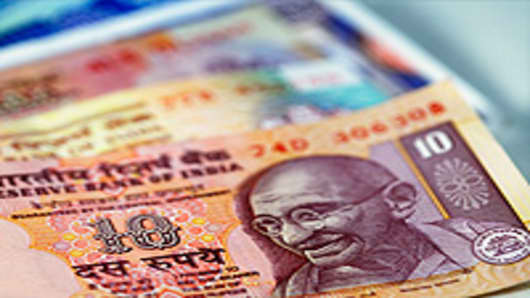While the record fall in the rupee has escalated India’s ongoing economic crisis, the head of private sector lender Kotak Mahindra Bank says the currency’s weakness could actually prove to be good for the economy.
“Some of India’s macro economic imbalances are getting corrected by a weaker rupee. I do believe that we need this, (the rupee’s fall). It is significantly important for India’s competitiveness,” Uday Kotak, Managing Director of India’s fourth-largest bank by market capitalization, Kotak Mahindra Bank, told CNBC Asia’s “Cash Flow” on Monday.
“As long as the central bank and (India) as a country ensure that a weaker rupee doesn’t lead to a loss of confidence, I think its good for economic fundamentals and a correction of India’s macro economic balances,” he added.
The rupee , Asia’s worst performing currency this year, has declined 12 percent against the U.S. dollar over the last three months - hitting a record low last week. Weakness in the currency has been driven by global risk aversion and worries over India’s slowing economic growth.
While India is largely a consumption driven economy, exports, which benefit from a weaker rupee, account for almost one quarter of the country’s gross domestic product (GDP). Some of its biggest exports include IT services, fabrics, precious stones and metals.
Falling Oil Prices to Help Too
In addition to the falling rupee, Kotak says the downturn in global commodity prices, particularly in oil prices, is another positive factor for Asia's third-largest economy, which imports nearly 80 percent of its crude needs.
“The good news right now is that the commodities cycle is correcting and oil prices are dropping. Therefore (in the) long term, this will have a significant impact on India’s current account deficit,” he said.
India’s current account deficit, which currently stands at 4 percent of gross domestic product, is directly impacted by oil prices. Each $1 per barrel change in oil prices impacts the current account deficit by approximately $900 million, according to Nomura economists.
Over the last month, while Brent crude prices have fallen about 14 percent or $16 dollars, the rupee has declined 4 percent against the U.S. dollar.
By CNBC's Ansuya Harjani



